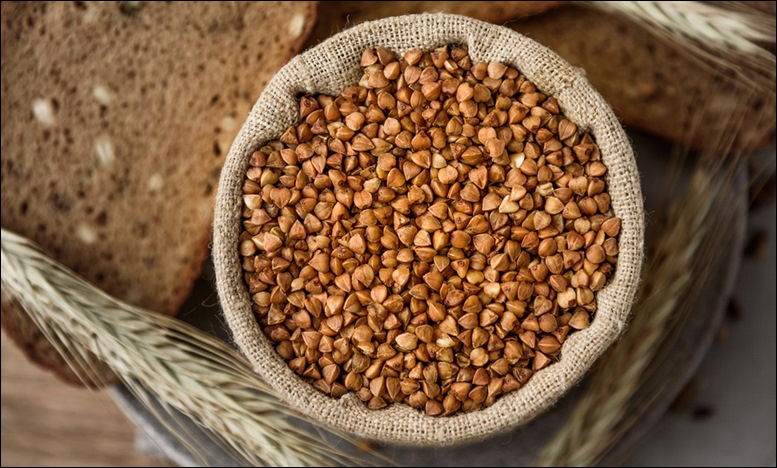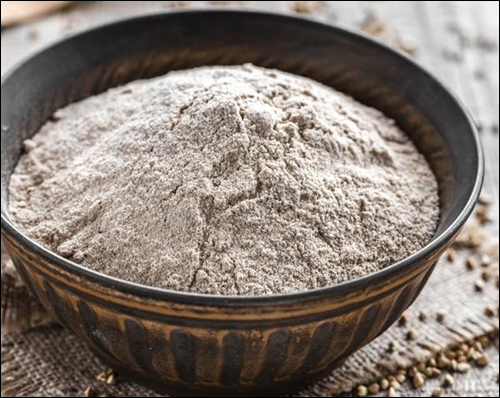Grains are considered as a source of power especially for vegetarians. Grains in adequate quantities are important for people of all age groups especially for growing children on a vegetarian diet as they help to build muscle as well as bone tissue and provide strength to the body.
One such grain is Buckwheat (Fagopyrum esculentum) which is gluten-free and is consumed in Asian countries since centuries and now becoming popular due to many countries like Canada, U.S., Europe etc. due to its multiple health benefits. It is a non-grass cereal which means that it is a pseudo-cereal.

Buckwheat is not a whole grain, it’s actually a seed that is high in fiber and protein. It is a non-grass cereal and doesn’t contain the protein gluten or any wheat. It is a member of polygonaceae family. It is a rich source of amino acids, vitamins, minerals and anti-oxidants.
Ayurvedic Qualities of Buckwheat
Buckwheat is known by the name Kasha in Ayurveda.
- According to Ayurveda, Buckwheat is dry and hot in nature, so it is beneficial for balancing Kapha dosha.
- Its diuretic properties are helpful for people who suffer from water retention and sluggishness.
- It is quite light in nature so if taken in excess it can aggravate Vata dosha. So, Buckwheat can be taken with Vata pacifying foods such as Cow desi ghee (clarified butter).
- People with Pitta dominant dosha may use buckwheat in moderation as it is hot in nature.
Health Benefits of Buckwheat
- Buckwheat helps in controlling blood sugar as it improves insulin uptake in the cells which is useful in insulin resistant diabetes. It is a source of complex carbohydrates has low glycemic index. These complex carbohydrates are absorbed in bloodstream slowly and helps in fighting the imbalances in blood sugar levels that lead to inflammation.
- It helps in improving blood circulation as it strengthens blood vessels and capillaries and increases circulation to the hands and feet.
- As it contains magnesium, it relaxes and nourishes the muscles. Magnesium also helps in improving digestion and protects the body from negative impacts of stress.
- Buckwheat aids in weight loss as it improves the metabolism without over-stimulating the body.
- Due to its drying and astringent properties, buckwheat is ideal for drying up mucus in the respiratory tract.
- This also helps in decreasing blood pressure, lowering inflammation and LDL levels while helping in preventing heart disease. It lowers bad cholesterol, LDL while increases good cholesterol, HDL because it contains a phytonutrient Rutin which is an important antioxidant for cardio-vascular health.
- It is ideal for people who suffer weakness due to low metabolism as it is ideal among metabolism building foods because it is nutritious and provides strength.
- Due to the presence of antioxidants and phenolic compounds, it can help in fighting cancer as they act as therapeutic agents against free-radical damage which is also known as ROS or oxidative stress.
- As buckwheat contains more protein than any form of rice, millet wheat etc., it provides essential amino acids which are essential for strength of the muscles and growth.
- The nutrients such as zinc, manganese, B-Vitamins are needed for neurotransmitter signalling in the brain that fight anxiety and depression are present in buckwheat.
- As buckwheat is different from grain, substituting gluten-containing grains with buckwheat can help in patients suffering from digestive disorders such as leaky gut syndrome, diarrhoea, constipation etc. It is ideal for patients who have celiac disease or a gluten sensitivity.
How to Use Buckwheat?
Buckwheat is available throughout the year. It is usually available in flour form or as raw buckwheat groats. Both these forms are highly nutritious staples.

- You can make chapati of its flour which can be enjoyed with cow’s ghee, curd or seasonal vegetable.
- The cooked groats can be added to salads, soups and can be taken in breakfast.
- It can be served as an alternative to rice and substitute to grains for people who are sensitive to wheat or other grains that contain the protein glutens.
Disclaimer:-
This article is not a substitute to the standard Medical Diagnosis or personalized Ayurvedic Treatment! It is intended only for Information!
For experts consultation, please write us at care@blessayurveda.com or click here to book appointment to consult online.
3,389 total views, 2 views today